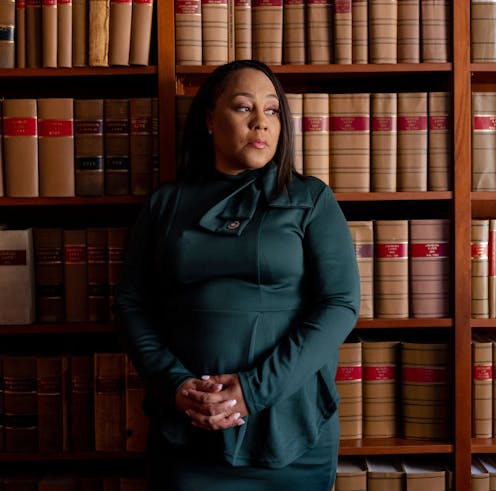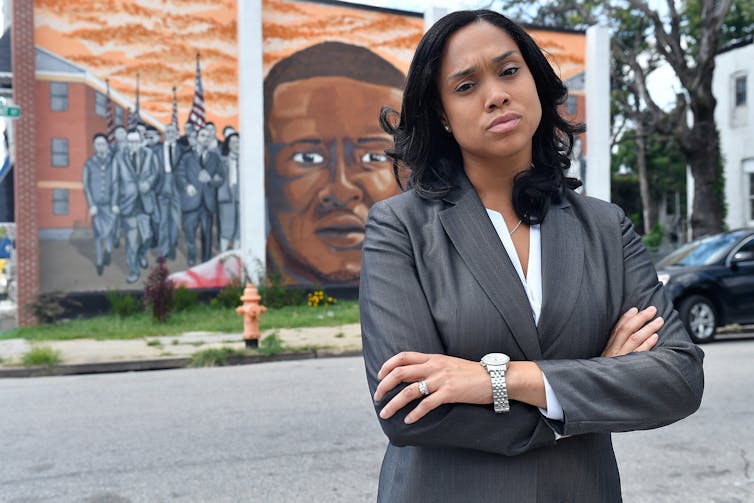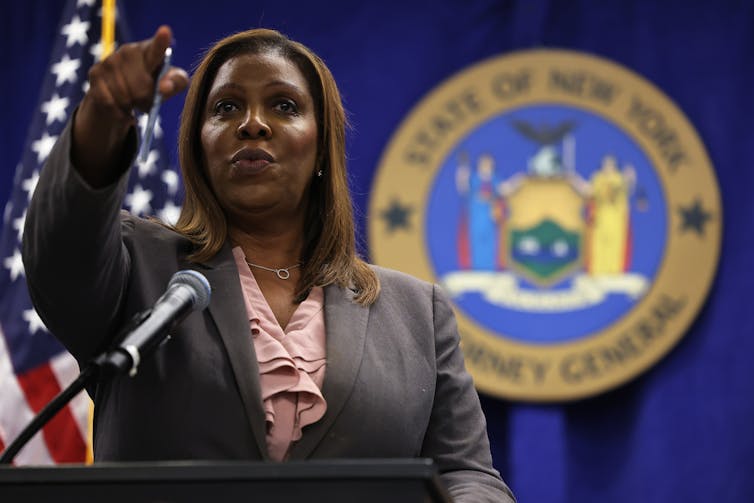
On the day he was indicted on financial fraud charges in a New York City courtroom, former U.S. President Donald Trump launched an attack against Fulton County District Attorney Fani Willis.
One of the handful of Black female prosecutors in the country, Willis has led a criminal investigation into Trump’s alleged campaign interference in the 2020 presidential election in Georgia.
“In the wings, they’ve got a local racist Democrat district attorney in Atlanta who is doing everything in her power to indict me over an absolutely perfect phone call,” Trump said on April 4, 2023.
The indictment that Trump feared came on Aug. 14, 2023, and alleged that Trump and 18 co-conspirators operated a criminal enterprise to overturn the results of the 2020 election results to keep Trump in power.
Trump used an unidentified member of his presidential campaign to launch another personal attack against Willis, calling her a “rabid partisan who is campaigning and fundraising on a platform of prosecuting President Trump through these bogus indictments.”
Trump’s attacks against Willis come at a time when Black women are increasing their numbers in the legal profession and face the same public scrutiny as their white male and female counterparts.
But in my view as a scholar of race and gender in American politics, Black female prosecutors have an extra burden of gendered and racist attacks, especially in the age of Trump.
Though Black women share the same responsibility as their white counterparts – enforcing the law and deciding who gets charged with what crime – many of their attempts to eliminate perceived structural racism and establish criminal justice reforms are often at odds with traditional tough-on-crime policies.
A steady growth
The number of prominent Black female attorneys today is a far cry from when Charlotte Ray became the first one in the U.S. in the late 1800s.
After graduating from Howard Law School in 1872, Ray became certified to practice in Washington, D.C., that same year. But because of racial and gender discrimination, she was unable to attract clients and later became a public school teacher in New York City.
Since then, Black women have steadily made progress, most notably in 1999 when Loretta Lynch became the first Black woman to serve as a U.S. attorney, and finally achieving the pinnacle on June 30, 2023, when Ketanji Brown Jackson was sworn in as as associate justice of the U.S. Supreme Court.
But progress has been slow and fraught with peril.
According to a 2020 study, of the roughly 2,400 elected prosecutors in 2019, 45 of them were Black women, less than 2%.
Political and legal fights
The road to success for Black female lawyers has not been easy. Many of these women say their progressive political values have clashed with law-and-order conservatives who typically dominate local, state and federal courtrooms.
Kim Gardner, St. Louis’ first elected Black female prosecutor, became the city’s circuit attorney in 2016 in part because of her campaign promises to seek mental health or drug-abuse treatment for people convicted of low-level, nonviolent crimes. Once elected, she met fierce opposition from Republican state lawmakers and police union officials.
In 2020, the situation became untenable – for both sides. Gardner filed a federal civil rights lawsuit, accusing the city, the local police union and others of a coordinated and racist conspiracy aimed at forcing her out of office.
Though that federal case is ongoing, Gardner drew the ire of Missouri Attorney General Andrew Bailey, who filed suit in February 2023 to have her removed from office. Gardner resigned on June 1, 2023.

A similar situation occurred in Maryland in April 2015 when State’s Attorney for Baltimore Marilyn Mosby charged six police officers with the death of 25-year-old Freddie Gray. Shortly after the officers’ arrests, Mosby told ABC News that she received an email with the subject “Obituary of Marilyn Mosby.”
The email described Mosby being “gunned down in cold blood walking into the courthouse” and said her then-husband, state delegate Nick J. Mosby, was “found tortured and dismembered.” The email ended with, “several family members, related to Mr. and Mrs. Mosby, have been reported ‘missing’, the police are not currently investigating and feel that none of the missing are significant.”
Since then, Marilyn Mosby was indicted in 2022 on federal charges of perjury after she allegedly withdrew money from her deferred compensation accounts and made a false statement on a loan application. Prosecutors said Mosby lied to avoid paying taxes on the money.
Mosby has pleaded not guilty, and her trial is scheduled for October 2023.
The reality of public service
To Willis, Trump’s attacks and other racist threats are a part of her job.
Trump’s comments “do not concern me at all,” Willis told an Atlanta television station in April 2023. “It’s ridiculous in nature, but I support his right to be protected by the First Amendment and say what he likes.”
Trump’s ugly use of race is all too familiar to another Black female prosecutor.

New York Attorney General Letitia James led a nearly three-year investigation into Trump’s business practices and filed a $250 million lawsuit alleging widespread fraud against him, his New York-based real estate business organization and three of his children.
Trump has frequently used racist, derogatory words to attack James.
James has remained steadfast. “He should know that we here in New York – and I, in particular – we are not scared of you,” she warned Trump in September 2022.
Willis also drew a line. “People have that right to say whatever they choose to say as long as it does not rise to the level of threats against myself, against my staff or against my family,” she said in April 2023.
Bev-Freda Jackson does not work for, consult, own shares in or receive funding from any company or organization that would benefit from this article, and has disclosed no relevant affiliations beyond their academic appointment.
This article was originally published on The Conversation. Read the original article.







